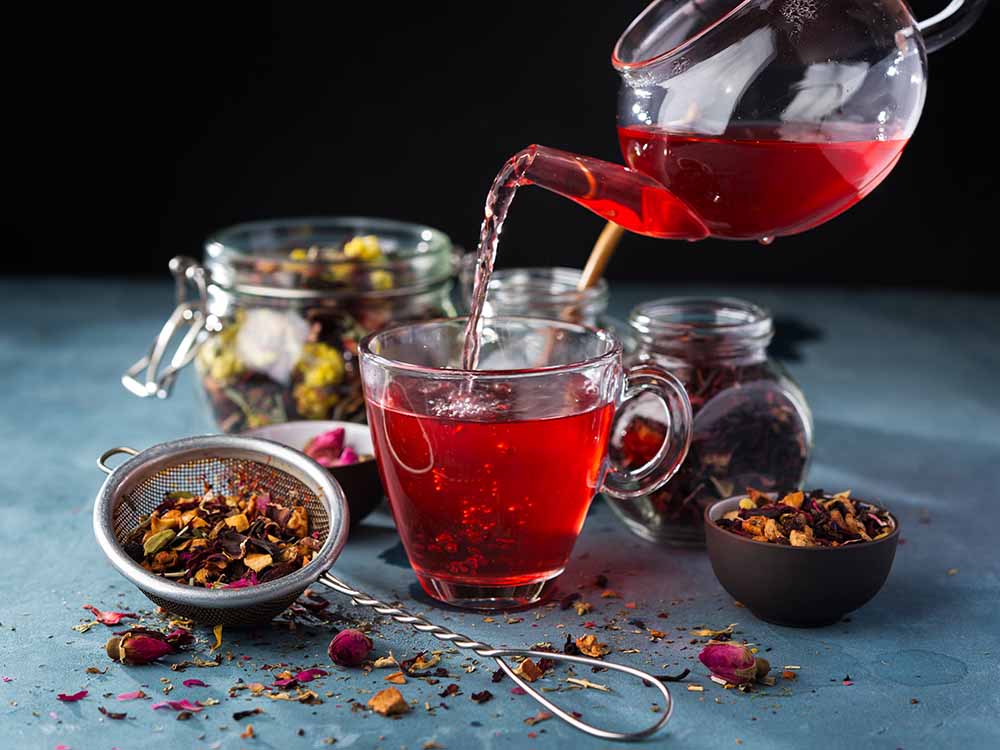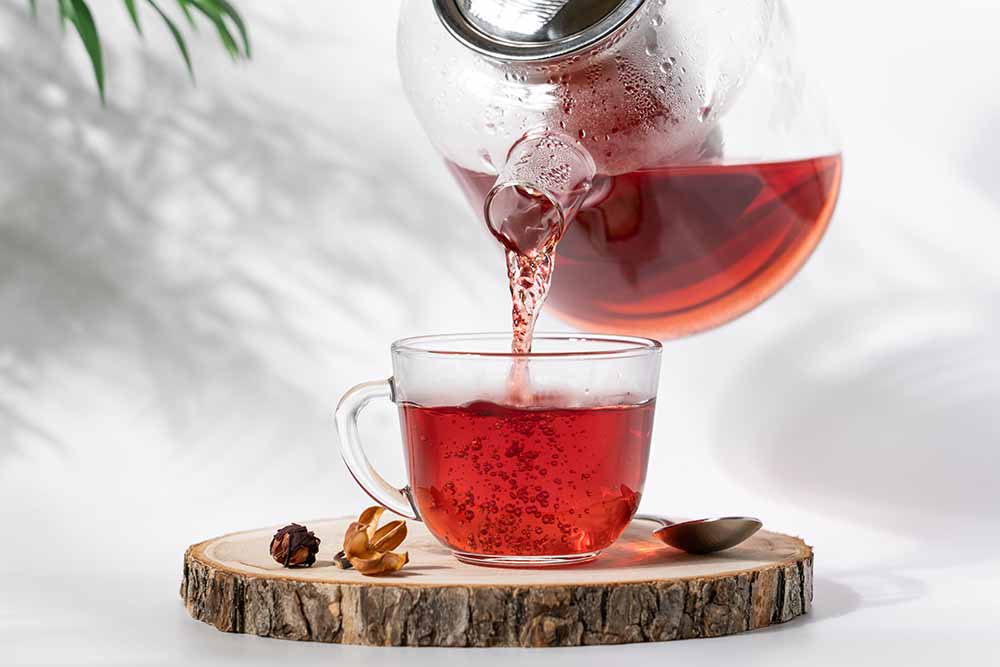Embark on an immersive sensory journey with our comprehensive guide to tea-making. Delve into the intricacies behind 6 distinct types of tea, from classic black to exotic herbal blends. Master the art of brewing each variety with detailed step-by-step instructions, and elevate your tea experience to new heights. Immerse yourself in the cultural nuances and health benefits concealed within each cup. Discover the soulful stories behind your favourite brews and transform your tea ritual into a celebration of flavour, tradition and well-being.
Tea, transcending generations and cultures, is an art form that goes beyond a simple beverage. It's a ritual, a cultural emblem, and a celebration of diverse flavours that tell stories of different lands and traditions. In this exploration, we extend an invitation to you to unlock the secrets behind various types of tea, promising not merely a guide but a rich and immersive experience into the enchanting world of tea-making.
Overview of Types of Tea
Originating from the leaves of the Camellia sinensis plant, tea unfolds into a world of five primary types—black, masala chai, green, white and oolong—each embodying a unique terroir and crafting process. As we navigate this aromatic landscape, we encounter herbal infusions, a delightful divergence from the traditional tea plant. This comprehensive journey is a holistic exploration of the nuances within each type, offering an unparalleled experience that tantalises the senses with a kaleidoscope of tastes, aromas, and cultural richness. Beyond being a beverage, tea becomes a portal to the traditions, histories, and craftsmanship of the regions that have cultivated and perfected these varieties for centuries.
Basic Tea Brewing Instructions
Before immersing ourselves in the rich tapestry of tea varieties, mastering the basics is essential. Commence with pristine, cold water, recognising that water temperature is a crucial factor in unlocking the nuanced flavours of each tea type. Whether utilizing meticulously selected loose leaves or the convenience of tea bags, the emphasis lies on the quality of the tea. Grasp the intricacies of steeping times and water temperatures, laying the foundation for a journey through the unique characteristics of each tea type. The water-to-tea ratio, the vessel choice and even the pouring technique contribute to the perfection of each cup, transforming the act of making tea into a mindful and intentional practice.

Type of Tea 1: Black Tea
Embark on a voyage into the world of black tea—a symphony of bold, assertive, and diverse flavours. Varieties such as Assam, Darjeeling and English Breakfast invite you to explore a spectrum of tastes. Elevate your black tea experience by embracing boiling water and steeping for 3-5 minutes. Customise the intensity with or without milk and sugar, unlocking the hidden nuances within each sip—a symphony of boldness and refinement that captures the essence of centuries-old traditions. Savouring a cup of black tea is not just a sensory experience; it's a journey through time, connecting you to the roots of tea culture and the artisans who have perfected this craft.
Type of Tea 2: Masala Chai
Dive into the heart of India with masala chai, a spiced tea that transcends its beverage status to become a cultural phenomenon. The art lies in blending black tea with a harmonious medley of cardamom, cinnamon, ginger, and cloves. Masala chai is a sensory delight, a celebration of complexity. Uncover its secrets by simmering black tea with the spice blend in a dance of milk and water. Sweeten to your liking and sip slowly, letting each aromatic note unfold—a rich tapestry of cultural heritage woven into every cup. Masala chai isn't just a drink; it's an embodiment of hospitality, a ritual that fosters connections and warmth.
Type of Tea 3: Green Tea
Step into the realm of health and tranquillity with green tea, celebrated for its delicate yet refreshing characteristics. Explore varieties such as Sencha, Matcha, Dragon Well and Gunpowder, each offering a unique flavour profile that reflects its origin. Brew with water just below boiling, allowing the leaves to unfurl for 2-3 minutes. Experiment with steeping times to find the ideal balance of bitterness and sweetness, immersing yourself in a journey that transcends mere refreshment and becomes a meditative experience. Green tea is not just a beverage; it's a wellness elixir, offering a moment of serenity and rejuvenation in each cup.
Type of Tea 4: White Tea
Experience the subtlety and purity of white tea, a testament to minimal processing. Varieties like Silver Needle and Bai Mu Dan offer a delicate and floral cup, capturing the essence of a delicate dance between nature and craftsmanship. Steep in water at around 175°F for 4-5 minutes, allowing the essence of the tea plant to unfold in layers. Each sip is an invitation to a world where simplicity meets sophistication, and every drop is an ode to the purity of nature—a delicate dance on the palate that whispers tales of tranquillity. White tea isn't just a beverage; it's a journey into the heart of tea craftsmanship, where every leaf is a work of art.
Type of Tea 5: Herbal Tea
Venture beyond the traditional tea plant into the realm of herbal infusions—a caffeine-free sanctuary of flavour and wellness. From the calming embrace of chamomile to the invigorating notes of peppermint, explore a myriad of botanical delights. Boil water and steep herbs for 5-7 minutes, creating a soothing infusion perfect for moments of relaxation and introspection. Let each herbal cup be a personalised journey, crafted by nature itself, offering not just a drink but a holistic well-being experience. Herbal tea is not just a beverage; it's a therapeutic ritual, a cup of nature's remedies that heals the body and soul.
Type of Tea 6: Oolong Tea
Immerse yourself in the nuanced world of oolong tea, a delightful blend of black and green tea characteristics. Varieties like Tie Guan Yin and Da Hong Pao present a diverse flavour spectrum, inviting you to unravel layers of complexity. Steep oolong tea in water just below boiling for 4-7 minutes, unveiling a cup that evolves with each sip. This journey is a testament to the artistry of tea-making, allowing the leaves to tell their story, a narrative that unfolds with every infusion. Oolong tea isn't just a beverage; it's a symphony of flavours that captivates and enchants, showcasing the skill and patience of tea artisans.
Type of Tea 7: Benefits of Having Tea
Beyond the delightful taste, tea is a treasure trove of health benefits. Rich in antioxidants, it promotes heart health, boosts metabolism, and enhances mental alertness. Whether you choose the robust black tea or the calming herbal infusion, incorporating tea into your routine is a small yet impactful step towards a healthier and more mindful lifestyle. Imbibe not just a cup but a dose of well-being with each sip, allowing the therapeutic properties of tea to be a daily ritual—a moment of self-care and rejuvenation. The benefits extend beyond the physical, fostering mental clarity and emotional balance, turning a simple act of drinking tea into a holistic wellness practice.

Conclusion
In this odyssey through the diverse world of tea, we've unravelled the secrets behind black, masala chai, green, white, herbal and oolong teas. Each cup is an artistic creation, offering not just a beverage but a sensory voyage. May your tea journey be as diverse as the flavours in your cup, and may each sip be a moment to savour—a celebration of culture, flavour, and the timeless tradition of tea. Here's to the countless stories brewed in every cup, and the promise of many more chapters to unfold. As you continue your exploration of tea, remember that each cup is a portal to a world of traditions, craftsmanship and well-being.
May your tea journey be an immersive exploration, a cultural odyssey, and a sensory feast. Happy brewing!
FAQs
How can I make the perfect cup of black tea?
Begin with high-quality black tea leaves, utilise boiling water, and steep for 3-5 minutes. Adjust steeping time based on personal taste. Experiment with milk and sugar to customise the intensity.
What spices are essential for making masala chai?
Common spices include cardamom, cinnamon, ginger, and cloves. Adjust proportions to suit personal taste preferences. The beauty of masala chai lies in its adaptability—make it your own!
Can I add milk to green tea?
While uncommon, some people enjoy green tea with a splash of milk. Experiment to find your preferred balance, keeping in mind that green tea is delicate and may require adjustments in quantity.
Is white tea caffeine-free?
White tea contains lower caffeine levels than black tea but is not entirely caffeine-free. If you're seeking a lower-caffeine option, white tea is an excellent choice.
What are the health benefits of herbal tea?
Herbal teas offer various health benefits, including relaxation, improved digestion and immune system support. Explore these benefits as you savour each cup, indulging in a holistic well-being experience. Remember, herbal tea is a versatile canvas for wellness.